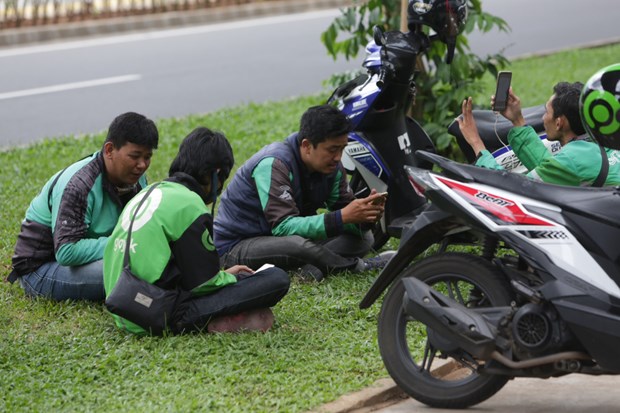Indonesia keeps close watch on Gojek-Grab merger for fear of monopoly
 |
| Gojek and Grab drivers check their phones while waiting for customers in Jakarta on April 7. (Photo: JP) |
Jakarta – As Southeast Asian ride-hailing giants Gojek and Grab are reportedly discussing a merger deal, Indonesian officials and experts have warned that a consolidation of such dominant companies may cause a market monopoly.
Indonesia’s Business Competition Supervisory Commission (KPPU) would evaluate any corporate actions based on their effect on market concentration and competition post-merger and acquisition, KPPU commissioner Guntur Saragih has said.
Every corporate action can affect the market structure, especially mergers and acquisitions, he said. If the Grab-Gojek merger were to happen, the commission would need a notification no later than 30 days after the merger is made effective, he added.
Indonesia’s online transportation market was already highly concentrated under the only two major players, said research assistant Kimberly Tanos at the Institute for the Development of Economics and Finance (Indef). A merger between the two companies will have a potential for a market monopoly and that is why it is important to have an extensive study of this merger possibility by the KPPU, she said.
Kimberly said a merger would benefit the two companies as they could share infrastructure, technology and lessen operational and marketing costs. However, the plan could have an adverse effect on consumers and driver-partners in the form of higher prices and limitations on driver numbers under a new platform.
With less competition, prices for ride-hailing services could go up as there would be only one company controlling the market, Kimberly said.
Gojek and Grab are the two largest ride-hailing companies in Indonesia, which are valued at about 10 billion USD and more than 15 billion USD respectively. In 2018, Grab acquired American ride-hailing company Uber in Indonesia as the latter left the Southeast Asian market.
What the stars mean:
★ Poor ★ ★ Promising ★★★ Good ★★★★ Very good ★★★★★ Exceptional
 Tag:
Tag:
Related Contents
Latest News
More News
- ASEAN Digital Ministers' Meeting opens in Hanoi (January 15, 2026 | 15:33)
- ASEAN economies move up the global chip value chain (December 09, 2025 | 13:32)
- AWS unveils major AI innovations at re:Invent 2025 (December 04, 2025 | 19:06)
- Japanese embassy marks 20 years of Japan-ASEAN bond market support (December 02, 2025 | 16:57)
- Vietnam leads ASEAN in consumer optimism (November 26, 2025 | 15:58)
- CPTPP ministers convene council meeting in Melbourne, launch new accession talks (November 22, 2025 | 11:33)
- Flu wave hits Southeast Asia, highlighting gaps in protection for the elderly (November 06, 2025 | 12:13)
- 72 nations sign landmark Hanoi cybercrime convention (October 26, 2025 | 18:00)
- UN Secretary-General commends Vietnam’s global leadership (October 26, 2025 | 09:00)
- APEC finance ministers convene to tackle regional challenges (October 22, 2025 | 17:31)






















 Mobile Version
Mobile Version